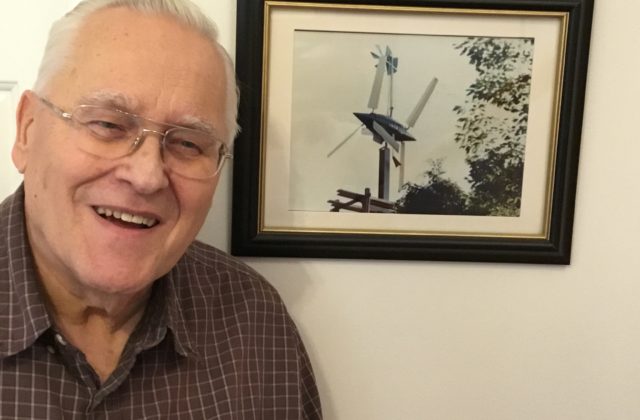Neighbors in the News
Torpedoed Ship and Stolen Identity Are Basis of Author’s Second Novel
Text by Colleen Gundlach
Photo Courtesy of Frank Buyak
It was spring, 1939, and the feeling of unrest in Europe was increasing. World War II was in the offing. Frank Buyak was less than two years old when he, his brother and his mother were visiting relatives in Ireland. Soon preparations for war made it difficult to book space on a return ship home to America, but the family was eventually able to book space on the SS Athenia. As fate would have it, the passage was overbooked, and Buyak and his family were bumped from the boat and had to take a later voyage.
That overbooking spared Buyak’s life. The Athenia was the very first British shop to be sunk by the Germans in World War II, with a loss of 117 civilian passengers, 28 of whom were U.S. citizens. Buyak’s family sailed on the SS Aquitania, which was diverted to pick up survivors of the Athenia tradegy.
That is a true story of the early life of Norfolk resident Frank Buyak, who has turned this historical experience into a fictional novel of intrigue and deception, titled “Passport to Deception”. The novel’s heroine, Marie Annette Watson, survives the sinking of the Athenia, steals the identity of her traveling companion who died in the attack, and goes on to live a life of lies and lofty ambitions – with a surprise ending. And, if one looks closely at the cover of this book, as drawn by Buyak’s nephew, one will recognize a certain hotel in Great Barrington, Mass.
Buyak’s second novel, titled “Hotel Saratoga” is, says Buyak, “as different from ‘Passport to Deception’ as it can be. One critic even said she couldn’t believe the same person wrote both novels.” “Hotel Saratoga” is a regular, old-fashioned gumshoe detective story based on actual heist that occurred in Waterbury many years ago. “I’d love to see this novel made into a screenplay,” he says. “It would be hysterical.”
This 81-year-old successful author never set his hand to novel writing until well into his retirement years. Prior to that, he managed to earn an M.A. in education, a B.A. in arts and science an A.S. degree in business and two A.S. degrees in engineering, while traveling the world. “I worked for Pitney Bowes,” he says. “It is a great company and they had educational reimbursement, so I just kept going to school.”
During the 42 years that he worked for Pitney Bowes, he was based in Stamford, Ct., but had a variety of jobs. He spent several years in England, where he developed a 21-course curriculum for training students in manufacturing technology. The program was certified by the British government and Buyak even received an award from the Queen’s Government. This program hired teachers who were home on maternity leave. This gave the mothers a chance to have a part time job and provided a stream of instructors for the manufacturing program.
Buyak says he once spent $83 million dollars developing a computer system for Pitney Bowes that revolutionized the dispatching of service and marketing people. “The service people would come into the office and wait for a phone call or make cold calls themselves. This program we developed kept the prospects flowing directly to the service people from a computer. They rarely needed to come into the office after that.” The project reportedly took five years to develop, but saved the company an estimated $400 million.
Teaching was Buyak’s passion, and, in addition to England, he spent several months teaching in Germany and later, a year in Washington, DC. Before that, though, while serving as a Supply Sergeant in the U.S. Air Force from 1960-1966, he earned his pilot’s license, and flying became his favorite hobby.
Born in Torrington and growing up in the Bakerville section of New Hartford, Buyak lived most of his adult life in Pound Ridge, N.Y., where he raised his two children. In 1976, when then-President Nixon stated that America needed to be independent from fossil fuel energy, Buyak decided to build a windmill on his Pound Ridge property. “It was a 5-horsepower windmill with a propeller on the front and the back. It generated enough electricity to heat the house,” he says, and cost him $1,500 to build.
The unusual design of the windmill caught the attention of the University of Connecticut, and the college sent their engineering students to Pound Ridge to study it. Soon Design News magazine picked up the story and before he knew it, Buyak was recording a television commercial about wind power for “Wind Power for Your Home” magazine.
Eventually he decided he wanted to get away from city life, and started looking for a country home. Thanks to a nudge from his brother, Richard, who already was living in Norfolk, Buyak bought land right next door to his brother and started his new life in Norfolk. Since then, he hasn’t slowed down much. In addition to writing two books, he has worked with the Robotics Team at Northwestern Regional 7, helping to set up the shop and with the design of a robot.
Buyak has no plans to slow down in the near future, so watch for upcoming new books and accomplishments.
Passport to Deception and Hotel Saratoga can both be purchased on Amazon, XLibris or at Barnes and Noble.

